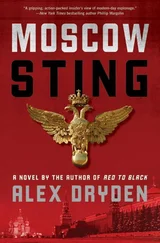Alex Dryden
THE BLIND SPY
To Mia, I love you anyway
Everyone imposes his own system as far as his army can reach.
—Joseph Stalin, April 1945
You don’t understand, George, that Ukraine is not even a state.
—Vladimir Putin to George W. Bush, April 2008
 PROLOGUE
PROLOGUE 
AUGUST 1971
LIEUTENANT VALENTIN VIKTOROV WALKED carefully and with evident hesitation through the labyrinth of Aleppo’s covered souk. He might have seemed lost to those moving past him quickly on their errands. But, lost or not, it was clear that he had his mind on things other than his surroundings.
He was a tall man with short-cropped fair hair and an athletic build. His face was so finely shaven, his skin so smooth, that he looked almost too young to be shaving at all. He certainly looked far younger than his twenty-seven years, and gave off an appearance of a young Russian army conscript on leave, rather than the seasoned KGB intelligence officer that he was.
Despite the fact that he was not on official assignment this summer morning, he was operating as he always did for KGB undercover work when he was outside the secret, protected spaces of the Soviet spy elite, places like the embassy compound in Damascus from which he had set off before the sun came up. He carried no identification from the embassy that would get him out of trouble if that was what he was heading into. If anything went wrong, he was unprotected.
But the difference between a normal undercover operation and his activities this morning was that this was a personal mission—one that would have drawn deep disapproval from his boss, should he have known of it, possibly bringing an end to his career altogether.
Dressed in the drab civilian clothes of Soviet Russia he seemed, like Russia itself, drained of colour and bereft of joy. In this he was clearly distinguishable from the bustling and colourful Arab throng in the souk. Not just his clothes and his height, but also his pronounced Slavic features set him distinctively apart from the Arabs.
He was distinguishable, too—though more subtly so—from the few, mostly Western tourists. Unlike Valentin, they were all staring wide eyed at their surroundings and carrying armfuls of cheap souvenirs that they would be taking back home with them. Unlike nearly all of these other visitors to the souk that morning, Valentin seemed unimpressed by his surroundings and he carried nothing that was visible.
Only the thick packet concealed in his buttoned-down shirt pocket and the small emergency pistol tucked away beneath the waistband of his trousers accompanied him.
But there was something about his urgently controlled movements, the hard muscles of his body visible through the shirt, and his alert and watchful eyes that suggested he was something altogether other than a tourist anyway. He looked like a man prepared, and preparing, for some kind of sudden action that was in another order of things entirely separate from a shopping expedition. There was, too, a sense of latent violence about him; his toned and muscled body appeared to reach out for a reason to be employed to the full. He was a pumped-up sportsman, a human missile ready to go off. And unlike the tourists, he spoke fluent Arabic.
Valentin paused with the minute attention of a bookkeeper at the cupboard-size shops on either side of the narrow alley. But he didn’t really look at their contents. If his eyes were focused at all on what was around him, he looked without seeing. There was a nervousness about him, which expressed itself in small, tense movements. He repeatedly brushed his short-cropped fair hair with one hand and occasionally touched the buttoned-down pocket of his white shirt with the other to reassure himself that the package was still there. The muscles of his lean jaw twitched every time he felt the package, and after each contact with it he thrust his hands back into the pockets of his grey trousers as though to physically restrain himself from his obsessive checking.
Valentin walked on, blindly surveying the overfilled alcoves crammed up against the alley that was wide enough for a donkey loaded with panniers to pass by, but not much else.
Anyone who watched him closely would have said that he wasn’t truly looking for anything, in fact; that he wasn’t a potential customer at all, and that his mission was actually elsewhere than in the souk. The souk and its multitude of variegated delights were there to slow him down, to delay an arrival of some kind. And in his heart, he knew that he was stopping deliberately. And he knew that the reason for these pauses was in order to postpone his purpose—they were not the purpose itself.
The traders and hawkers who crowded the souk’s alleys on either side of him were volubly selling their jute sacks of multicoloured spices, green and mauve soaps piled up like sweet-smelling brick walls, lurid meats that dripped blood from hooks and butchers’ blocks and which ran thickly away into the runnel along the centre of the stone alleyway. And then there were other shops that sold the red-and-white keffiyehs the Arabs wrapped around their heads, the silk and nylon dresses in gaudy gold and green, the striped woollen jellabahs, the sheepskins that betrayed the rancid smell of undercuring, the vegetables piled high in pyramids, the tin and brass lamps and lanterns…On it went, fifteen kilometres of covered market in all, a warren of commerce that sold produce from China and central Asia, the Levant, the Arab countries, Russia—even the West—in this place, Aleppo, the world’s oldest of trading cities.
And in every direction in which Valentin flickered his sharp, electric-blue eyes, what he saw were the photographs of the Soviet Union’s ally, the stern president of Syria, Hafez al Assad, which, whether faded or new, looked down on the commerce and haggling, the conversation and coffee drinking, like a looming superstition that threatened reprisal of some kind, rather than a figure of flesh and blood. Valentin was accustomed enough to the threatening faces that gazed down from walls back in his own country to hardly notice this one.
He stepped aside for a man with a frayed stick who was driving a donkey laden with baskets of green leaves along the covered narrow alley. The man, like all the other Arabs, barely looked at him and, when he did—and then only briefly—it seemed to be done deliberately, without curiosity. Was it fear of contact with foreigners that kept their eyes cast aside after the briefest of glances? No, he thought, the foreigner—whether a casual tourist or one of the Russian military and intelligence personnel like himself—was irrelevant to their daily lives. These people simply went about their business, that was all.
Not for the first time, Valentin was shocked by the freedom and social detachment that commerce brought to the people even under a dictatorship like Syria’s—and which was absent in his own country where commerce was a dirty, even a criminal word.
And Valentin suddenly felt how close he was to his own country. He was well into the last week of his posting to Syria. Three years it had been since he’d first been sent down from Moscow. He’d graduated from the KGB school at Balashiha-2 in the Forest, outside Moscow, then he’d spent two years behind a desk. He’d learned Arabic and was taken under the wing of a rising star in the KGB’s foreign intelligence department. This senior officer had then requested Valentin’s transfer to Damascus, where this mentor had been made head of station. And now, in just over five days, Valentin would be returning to Moscow again for another posting, to another Arab country, he supposed—or maybe it would be just a desk job at the KGB’s highly secretive Department S, in the Arab section, of course.
Читать дальше

 PROLOGUE
PROLOGUE 










